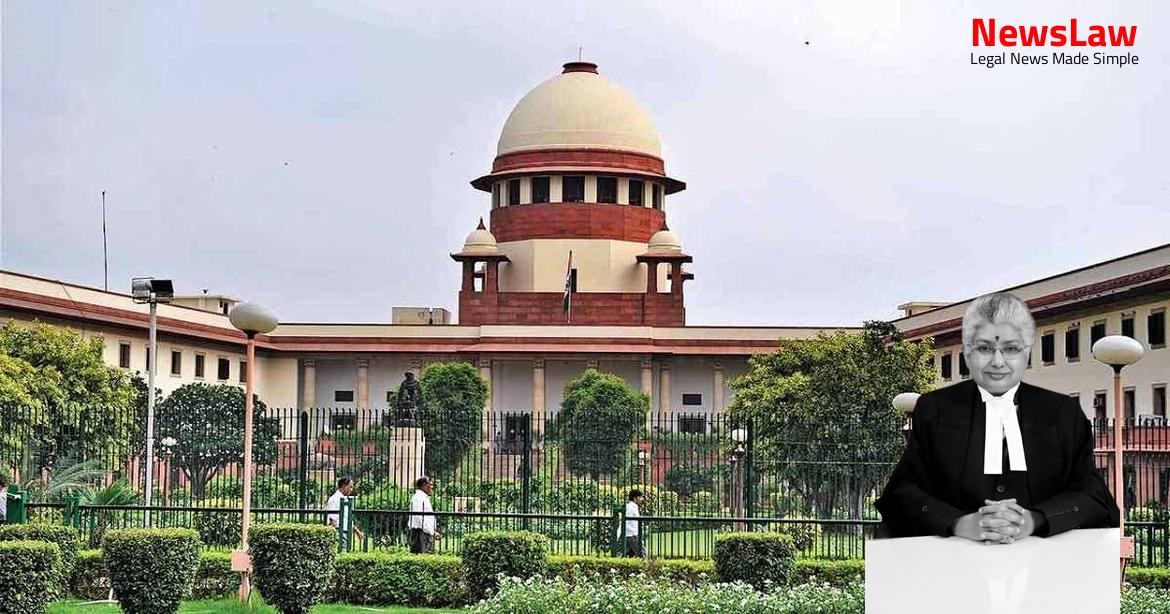In a significant legal case, the Supreme Court of India addressed the matter of Moola Gounder and the Legal Heirs regarding the partition of Joint Hindu Family Property. The judgment explores the intricacies of Hindu succession laws and the devolution of coparcenary property amongst surviving members. Stay informed on this crucial legal precedent!
Facts
- Moola Gounder along with his sons Palanisamy and Arumugam formed a coparcenary owning the suit property.
- Defendant no. 1 acted as the guardian of defendant no. 2, representing both sons in the release deed.
- The partition deed between defendant nos. 1 and 2 was executed, and they have been in possession of the property since.
- The release deed signed by the mother of the plaintiff on her behalf was challenged as void due to lack of court sanction.
- Upon Moola Gounder’s death, 1/3 of the property went to each son, and the remaining 1/3 was to be shared by his wife and three daughters.
- Following Moola Gounder’s death, a suit was filed by his youngest daughter to partition the inherited property among the legal heirs.
- The daughters and the mother relinquished their rights in the property through a registered release deed in favor of defendant nos. 1 and 2.
- The release deed was deemed void ab initio and did not need to be challenged.
- The property was recognized as joint property of all legal heirs of Moola Gounder.
- The plaintiff’s suit was decreed by the court.
- The High Court agreed that the property post Moola Gounder’s death was Joint Hindu Family property.
- It was determined that the mother could not have acted as guardian of the minor in this situation.
- The trial court dismissed the suit citing the mother as the natural guardian of the minor daughter.
- The plaintiff did not take steps to challenge the release deed within the three-year limitation period after attaining majority.
Also Read: Interpretation of Pre-deposit Requirement under SARFAESI Act
Arguments
- Mr. Jayanth Muth Raj, learned counsel for the appellant argues that notional partition occurred before the death of Moola Gounder
- Surviving members of the coparcenary, defendant nos. 1 and 2, were deemed to get 1/3 share each with the remaining 1/3 belonging to Moola Gounder
- According to Section 6 of the Succession Act, on the death of a male Hindu, his interest in coparcenary property devolves by survivorship upon surviving members and not as per the Act
- Arguments were presented by Mr. Jayanth Muth Raj for the appellant and Mr. V. Prabhakar for the respondents-plaintiff
Also Read: Inquiry and Cooperation: NCPCR vs. WBCPCR Judgment
Analysis
- Explanation to Section 6 states that the interest of the Hindu coparcener is deemed to be his share in the property if partition had occurred before his death.
- Court ruled that the deemed partition should consider all consequences of a real partition, meaning heirs must be ascertained as if they had separated during the deceased’s lifetime.
- The Karta of joint family property is the manager and can dispose of his interest.
- Section 19 and 30 stipulate that heirs succeed as tenants in common, not joint tenants.
- In a family settlement, the Karta cannot act as guardian when minors’ shares are relinquished to him.
- The interest of a male Hindu in coparcenary is treated like self-acquired property to protect female Class-I heirs.
- The document terming to be a release deed was deemed void as the Karta cannot act as guardian in such situations.
- If deceased leaves a Class-I female heir, the interest in coparcenary devolves as per provisions of the Succession Act, not by survivorship.
- Hindu males can dispose of their share by Will or testamentary disposition.
- Heirs in Class I of Schedule under Section 8 include widow, mother, daughter of predeceased son, etc.
- The partition deed of 24.04.1980 involved properties now claimed by the plaintiff, with her husband as an attesting witness.
- The property in question was not inherited by Moola Gounder’s legal heirs in their individual rights but only as the property of a Hindu Undivided Family.
- The property was considered joint Hindu family property with only the Karta, defendant no. 1, able to represent the minor.
- When two or more heirs succeed together to the property of an intestate, they shall take the property based on specific guidelines stated in the Act.
- In cases where a male Hindu dies with an interest in a Mitakshara coparcenary property, the devolution of the property differs based on certain conditions.
- The question at hand was whether the mother could act as the natural guardian of the minor daughters in respect of the property inherited from Moola Gounder.
- Section 6 of the Hindu Minority & Guardianship Act, 1956, outlines provisions regarding the natural guardians of a Hindu minor.
- Property inherited under Section 8 of the Hindu Succession Act is deemed to be the individual property of the person who inherits it and not joint family property.
- Inheritance under Section 8 creates individual ownership, and not co-ownership as in the case of joint family property.
- The property inherited in this manner is held as tenants-in-common and not as joint tenants.
- The judgment of CWT vs Chander Sen established that property inherited under Section 8 does not belong to the Hindu Undivided Family (HUF) but to the individual heir.
- The Hindu Succession Act takes precedence over Mitakshara law in matters of inheritance and property rights.
- The plaintiff’s lack of awareness of the transfers is deemed unlikely.
Also Read: Prabhakar Tewari vs Vikram Singh and Malkhan Singh
Decision
- The appeal has been allowed.
- The judgment of the High Court dated 30.07.2008 has been set aside.
- The judgment of the trial court dated 29.11.1994 has been restored.
- Any pending application(s) have been disposed of.
Case Title: M.ARUMUGAM Vs. AMMANIAMMAL AND ORS. (2020 INSC 14)
Case Number: C.A. No.-008642-008642 / 2009



